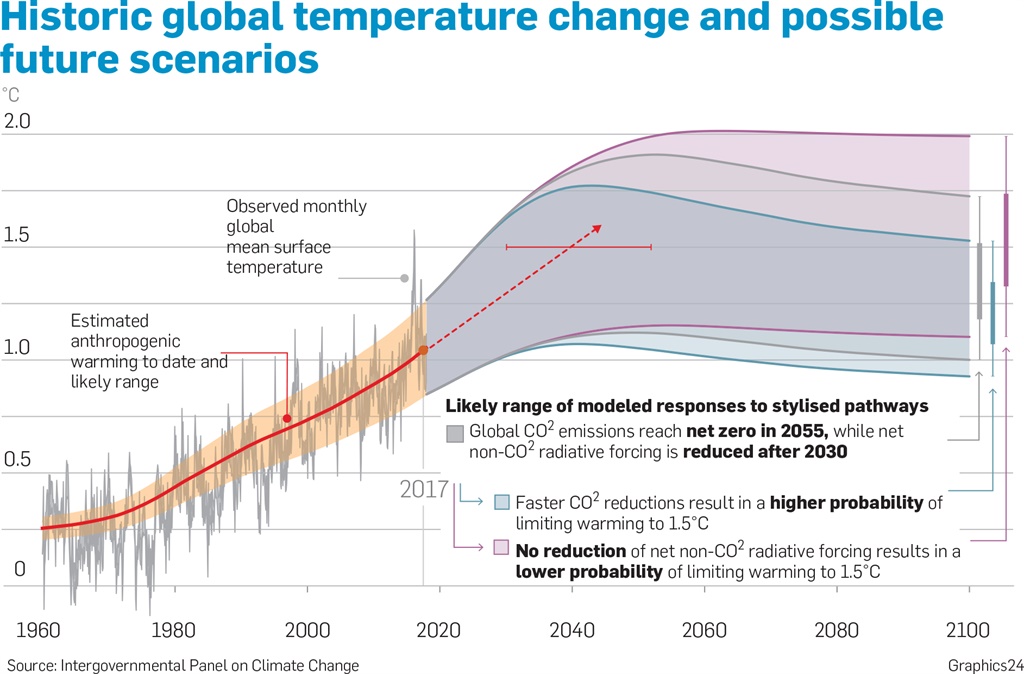
A new UN global climate change report reveals that South Africa will have to cut coal faster than planned if the country intends on honouring international commitments to play its part in keeping global warming below 1.5ºC.
A report by the Intergovernmental Panel on Climate Change (IPCC), released this week, reveals the serious effects of allowing global warming to reach 2ºC above pre-industrial levels, as opposed to curbing it at 1.5ºC – which is the level South Africa has committed to.
The IPCC is a UN intergovernmental body dedicated to providing the world with an objective, scientific view of climate change, and its political and economic ramifications.
The international body of scientists state that global warming has already increased by 1ºC, with marked effects that can be seen in the agricultural sector.
Agri Western Cape CEO Carl Opperman agrees, saying the province’s agricultural sector “has clearly seen the impact of climate change over the past few months”, with damage caused by the ongoing drought there estimated at R14 billion.
According to the IPCC’s global warming report, the situation is dire: it states that a further 0.5ºC temperature increase spells exponential increases in climatic extremes across almost all natural systems and human activities. For instance, 10 million people are expected to die from the effects of global warming if the 1.5ºC mark is reached, increasing to a predicted 140 million deaths at 2ºC.
Similar increases caused by the 0.5ºC difference are predicted for extreme weather events to become more frequent and for the destruction of terrestrial and marine ecosystems. These will have a dire effect on crop yields, fisheries and even tourism.
To stay within 1.5ºC, the 74 authors of the IPCC report say the use of coal globally will have to be phased out completely by 2050, and halved by 2030 (45% below 2010 levels).
The Minerals Council SA said the country mined 252 million tons of coal last year, with about 70%, or 180 million tons, used domestically in producing power. So, if we are to stick to our Intended Nationally Determined Contribution – our official pledge to combat global warming, as signed at the COP21 in Paris in 2015 – we would have to reduce our coal production to 90 million tons within 12 years.
This would likely entail a loss of about 40 000 of the 82 248 jobs in the coal-mining industry, mostly in Mpumalanga, according to the Minerals Council.
The draft Integrated Resource Plan (IRP) – referring to the long-term planning of South Africa’s power generation from various energy resources – determines to reduce coal to 44% of our energy mix by 2030.
However, the report shows that South Africa needs to bring output down to about 35% or less.
South Africa’s official pledge is to reduce emissions to between 398 and 614 millions tons (Mt) of CO2 equivalents between 2025 and 2030, dropping to between 212Mt and 420Mt by 2050.
Jesse Burton, a researcher at the University of Cape Town’s Energy Research Centre, said South Africa is in the middle of that range, but the IPCC’s new report shows that the country needs to be at the bottom of, or below, the planned range.
But, she added, technological advancements meant it was now cheaper to generate electricity with renewables rather than coal or nuclear, so it was “easy to switch” in the electricity sector – although currently, there were no alternatives to coal for industries such as iron and steel manufacture, or cement.
She said agreements such as the construction of two coal-fired electricity plants by independent power producers – expected to come online by 2021 – might have to be shelved, and government would have to retire ageing coal-fired stations earlier than planned.
Energy Research Centre director Harald Winkler said the report revealed the need for “a just transition away from coal, and towards community renewables and low-carbon energy systems”.
“Very significantly, this will require redistribution of resources, both across and within countries.”
Winkler said the IPCC report also highlighted the need for changing our systems in energy, land, urban and industrial development. These changes would have to support transformation and reduce poverty and inequality.
Burton explained that getting rid of coal would reduce the burden of disease caused by air pollution, which affects poor communities living in and around coal mines and power stations.
Transforming the transport sector to electric vehicles and to rail for public transport would improve commuting for the poor, who lived predominantly on the city’s margins.
Transforming urban land use meant people would be able to walk or cycle to work. This, in turn, would reduce poverty and inequality, and improve quality of life.
Tasneem Essop of the National Planning Commission (NPC) said the IPCC report “calls for systems transition, which is going to be extremely difficult in South Africa”.
Speaking in her personal capacity – as the NPC had not yet formulated an official response to the report – Essop said South Africa’s particular challenge was our reliance on coal, combined with “massive contestation by vested interests” over the renewable energy sector.
She said what was needed was a process which included all stakeholders in planning “a just transition” that would protect workers’ rights and interests.
She called for the creation of opportunities for job absorption in other sectors as well as for the reskilling of workers.
Where these were not possible, social protection measures for those workers were needed.
Essop said the unions had been calling for such a planning process “for a long time”, adding that the NPC was busy convening such a process.
Implementing a just transition and “a paradigm shift” by changing what we choose to focus on within our industrialisation and manufacturing programmes, as well as by focusing on renewables and rethinking our land use, would result in “a huge opportunity to address all socioeconomic challenges”.
It is not about government spending more money, it is about how it is spent, said Essop.




 Publications
Publications
 Partners
Partners










